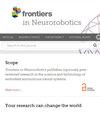I-BaR: integrated balance rehabilitation framework
IF 2.6
4区 计算机科学
Q3 COMPUTER SCIENCE, ARTIFICIAL INTELLIGENCE
引用次数: 0
Abstract
Neurological diseases are observed in approximately 1 billion people worldwide. A further increase is foreseen at the global level as a result of population growth and aging. Individuals with neurological disorders often experience cognitive, motor, sensory, and lower extremity dysfunctions. Thus, the possibility of falling and balance problems arise due to the postural control deficiencies that occur as a result of the deterioration in the integration of multi-sensory information. We propose a novel rehabilitation framework, Integrated Balance Rehabilitation (I-BaR), to improve the effectiveness of the rehabilitation with objective assessment, individualized therapy, convenience with different disability levels and adoption of assist-as-needed paradigm and, with integrated rehabilitation process as whole, that is, ankle-foot preparation, balance, and stepping phases, respectively. Integrated Balance Rehabilitation allows patients to improve their balance ability by providing multi-modal feedback: visual via utilization of virtual reality; vestibular via anteroposterior and mediolateral perturbations with the robotic platform; proprioceptive via haptic feedback.I-BaR:综合平衡康复框架
全世界约有 10 亿人患有神经系统疾病。随着人口增长和老龄化的加剧,预计全球患病人数还会进一步增加。神经系统疾病患者通常会出现认知、运动、感觉和下肢功能障碍。因此,由于多感官信息整合能力的退化而导致的姿势控制缺陷,可能会引发跌倒和平衡问题。我们提出了一个新颖的康复框架--综合平衡康复(I-BaR),通过客观评估、个性化治疗、方便不同残疾程度的患者和采用按需辅助的模式,以及综合康复过程的整体性,即分别在踝足准备阶段、平衡阶段和迈步阶段,来提高康复的有效性。综合平衡康复通过提供多模式反馈来提高患者的平衡能力:利用虚拟现实技术提供视觉反馈;通过机器人平台的前胸和内外侧扰动提供前庭反馈;通过触觉反馈提供本体感觉反馈。
本文章由计算机程序翻译,如有差异,请以英文原文为准。
求助全文
约1分钟内获得全文
求助全文
来源期刊

Frontiers in Neurorobotics
COMPUTER SCIENCE, ARTIFICIAL INTELLIGENCER-ROBOTICS
CiteScore
5.20
自引率
6.50%
发文量
250
审稿时长
14 weeks
期刊介绍:
Frontiers in Neurorobotics publishes rigorously peer-reviewed research in the science and technology of embodied autonomous neural systems. Specialty Chief Editors Alois C. Knoll and Florian Röhrbein at the Technische Universität München are supported by an outstanding Editorial Board of international experts. This multidisciplinary open-access journal is at the forefront of disseminating and communicating scientific knowledge and impactful discoveries to researchers, academics and the public worldwide.
Neural systems include brain-inspired algorithms (e.g. connectionist networks), computational models of biological neural networks (e.g. artificial spiking neural nets, large-scale simulations of neural microcircuits) and actual biological systems (e.g. in vivo and in vitro neural nets). The focus of the journal is the embodiment of such neural systems in artificial software and hardware devices, machines, robots or any other form of physical actuation. This also includes prosthetic devices, brain machine interfaces, wearable systems, micro-machines, furniture, home appliances, as well as systems for managing micro and macro infrastructures. Frontiers in Neurorobotics also aims to publish radically new tools and methods to study plasticity and development of autonomous self-learning systems that are capable of acquiring knowledge in an open-ended manner. Models complemented with experimental studies revealing self-organizing principles of embodied neural systems are welcome. Our journal also publishes on the micro and macro engineering and mechatronics of robotic devices driven by neural systems, as well as studies on the impact that such systems will have on our daily life.
 求助内容:
求助内容: 应助结果提醒方式:
应助结果提醒方式:


